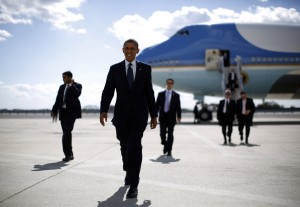UNITED NATIONS — President Barack Obama’s speech before the UN General Assembly was directed to two domestic audiences. One Main Street USA where outrage and anguish over the killing of American diplomats, the trashing of diplomatic property throughout the Middle East, and the seething resentment towards America is viewed as a both a bitter outcome of the Arab Spring and a questioning of the administration’s policies.
The other Street is the Arab Street, in many places throughout the Middle East and South Asia, where this cauldron of hate continues to simmer.

The UN address began with an emotional, moving and engaging tribute to American Ambassador Chris Stevens, killed in Libya by likely Al Qaida terrorists. The speech which was part eulogy and later lesson, presented an impressive vision of how America sees itself in the Arab world; as a politically transformative force; the old Peace Corps vision if you will. Much of the Arab Street does not see it that way.
First Obama’s reprimand. “The attacks on our civilians in Benghazi were attacks on America.” But why not be clearer, “the attacks on U.S. diplomats and civilians and the American Consulate in Benghazi,” were attacks on America, not to mention assaulting the U.S. Embassy in Cairo, Egypt?
“We insisted on change in Egypt, because our support for democracy put us on the side of the people … We supported a transition of leadership in Yemen … We intervened in Libya alongside a broad coalition … We again declare that the regime of Bashar al-Assad must come to an end so that the suffering of the Syrian people can stop.”
Though carefully using the phrase Arab Spring, the President deeply intoned, “So let us remember that this is a season of progress.”
Regarding the low budget anti-Islamic video which allegedly triggered many of the protests (curiously starting on September 11th) the President spoke of the “crude and disgusting video” sparking the outrage. While properly stating the U.S. government had nothing to do with the video (many on the rumor prone Arab Street see this a grand conspiracy), Obama then offered a lawyerly lecture on tolerance, and freedom of speech, which was equally balanced with moral relativism.
Speaking sternly and with conviction, he added, “There are no words that excuse the killing of innocents. There is no video that justifies and attack on an Embassy.”
This was not a classic UN address with broad-brushed themes of conflict resolution, humanitarian aid, and global economic assistance but a lecture on tolerance, intolerance and a tough-love formula for much of the Muslim world. “Understand that America will never retreat from the world … we will stand by our allies … But such efforts depend upon a spirit of mutual interest and mutual respect.”
Obama rightly warned the Arab Street “A politics based only on anger — one based on dividing the world between us and them — not only sets back international cooperation, it ultimately undermines those who tolerate it.” Namely, Americans on Main Street.
It almost appears that President Obama viewed the swell of anti-Americanism in the Middle East as a personal social slight after his once fawning outreach to both leaders and audiences in throughout the region. But American tolerance has its limits.
The Iran segment was measured and cautious yet more of the same we heard from past Administrations. “Let me be clear America wants to resolve this issue through diplomacy and we believe there is still time and space to do so. But that time is not unlimited …. Make no mistake: a nuclear armed Iran is not a challenge that can be contained. It would threaten the elimination of Israel, the security of Gulf nations and the stability of the global economy …… and that is why the United States will do what we must to prevent Iran from obtaining a nuclear weapon.”
Despite being in New York, Obama chose to forego his golden opportunity to have private one on one meetings at the UN debate, (something American presidents historically do) with leaders from Egypt, Jordan, Qatar, Pakistan among others, opting instead to return to the campaign trail and the golden haze of donor luncheons.
Here’s what the President didn’t address. Confronting the worldwide economic recession. There was no mention of North Korea’s nuclear program, the dangerous face-off between China and Japan over disputed islands, or anything for that matter about East Asia or the Pacific Rim.
There were none of the customary kudos for South American socio/economic success stories. Nor mention of the pressing humanitarian concerns of the African Sahel, Somalia, or Haiti. Nor deep thanks to allies Turkey and Jordan for accepting the waves of Syrian refugees.
So the tale of two streets, Main Street and the Arab Street, becomes the narrow narrative.
Absolutely important, but the world is a bigger and still wider place.
John J. Metzler is a U.N. correspondent covering diplomatic and defense issues. He writes weekly for WorldTribune.com.

